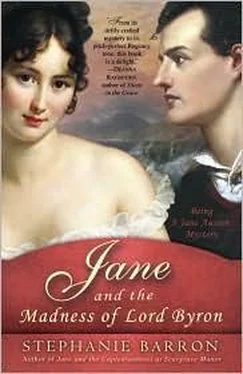“Regard it in the manner of a medicinal draught,” I ordered, “and swallow the dose all at once. I assure you, it is by far the best way of downing the stuff.”
She did as she was told, her eyes flying wide at the strength of the cordial; hiccupped; coughed; and then stared at me in outrage. “That was nothing less than liquid fire!”
“Very true,” I said with amusement. “You are beginning to be restored to yourself. Now tell me, if you will, how you came to be in Lord Byron’s charge.”
The girl flushed to the roots of her hair, and set aside her brandy glass. She could not meet my gaze, I found, as though I were a governess intent upon scolding her.
“I am only a little acquainted with his lordship,” she said, “and must confess that I have never felt any particular partiality for him. But it is— was —otherwise with him; he appears to have formed an attachment, and has pressed his suit most ardently in recent weeks, whenever he is in Brighton—for Brighton is my home, Miss Austen.”
“And being unable to return his lordship’s affection, you have repulsed his advances?”
She lifted her eyes to mine. “At every turn! We have only met some once or twice, at the Assemblies—he is but rarely in Brighton, being much taken up with Lady Oxford and her set, who remain fixed in London.”
Lady Oxford—the Countess of Oxford—was rumoured to be Byron’s latest paramour. A very great lady of some forty years of age, and the mother of five hopeful children—possibly by as many fathers—she had taken up the young poet as her latest lover, and kept him the whole of the winter at Eywood, the Earl of Oxford’s estate in Herefordshire. Or so I had gleaned, from the veiled hints of the Morning Gazette’s Society pages. Now it seemed Lady Oxford’s protégé was determined to play her false—with a girl young enough to be her daughter.
“His lordship will descend upon Brighton without warning,” Miss Twining persisted, “to indulge his passion for sailing; and on such occasions condescends to enter the Rooms at the Castle of a Monday evening, or even the Old Ship—which Assembly you will know is held on Thursdays—from time to time.”
This flood of information conveying very little to me, being a stranger to the town and its delights, I contented myself with a mere, “I see.”
“His lordship never dances, however,” the girl hurried on, “being ashamed, so they say, of his lame foot. But he often skirts the edge of the Assembly with one of his intimates—Mr. Scrope Davies, or Mr. Rogers—to whom he alone will speak; and being forced to sit out several dances myself, I have had some once or twice the privilege of conversing with him. I never sought his attentions, I assure you—tho’ all the town is wild about Lord Byron, and celebrates his verses, and swoons at his every entrance—I cannot like him, Miss Austen. Indeed, he frightens me.”
This last was uttered in a whisper; I saw the threat of renewed tears, and said hurriedly, “But this morning there was a change?”
She swallowed convulsively. “I am afraid I have been very foolish.”
I glanced at Henry.
“I was strolling with my maid along the Steyne, intending to exchange a book at Donaldson’s, when Lord Byron’s chaise came up alongside. Or rather—I should properly say Lady Oxford’s chaise, for it bears her ladyship’s crest, and is excessively well-sprung—the squabs are straw-coloured satin.”
“Indeed—it was an admirable equipage,” I stammered. Lord Byron had used Lady Oxford’s chaise to abduct another woman? “And his lordship invited you to take a drive?”
“He was all politeness. He told me he was bound for London, and should be deprived of my society for at least the next fortnight; he added that my cruelty should be beyond everything, did I not consent to spare him a few moments. He pined already for my society, he said; could I not bear him company so far as Donaldson’s, so that he might cherish my image the length of his journey to London?”
The gentleman was, after all, a poet, and the most celebrated Romantic of our age; what girl of fifteen should be proof against such ardent address? Miss Twining had dismissed her maid, and ascended into the carriage.
“But he did not stop at Donaldson’s,” she said wonderingly, “and indeed, he urged the coachman to all possible speed, so that we bowled out of town along the New Road at such a pace, I was forced to cling to the side-straps in sheer terror!”
She had attempted to flee the carriage when it slowed at Lewes; and it was then that Byron subdued her, his superior strength and the natural fear she bore him, combining to render her passive when he produced his cravats. His lordship was so good, at that juncture, as to inform Miss Twining of her intended fate: he travelled not to London but to the Border—a journey of several days’ duration—with a Gretna Green marriage in view.
Apprehending that after several days in the gentleman’s sole company, her reputation should be utterly ruined, Miss Twining cried—she pled for his lordship’s mercy—assured him that she could not love him; but her shrinking only inflamed Byron further. He was unaccustomed, it seemed, to rejection; the adulation of all the Polite World having convinced him that Miss Twining must be hoping for just such an avowal of ardent love.
“Marriage?” Henry repeated, all astonishment. “I had not thought Lord Byron much taken with the married state—unless it be to persuade those ladies already shackled with it, to break their sacred vows! He did you a decided honour, Miss Twining, in thus singling you out; you should be the wonder of your acquaintance, did they know of it. To make a conquest of Lord Byron!”
“Do not be so tiresome, Henry,” I retorted crossly. “You must know that she abhors the man!”
Outside Lewes, Byron overmastered her, and assured Miss Twining that she should not prove so missish within a very few hours—for her honour depended entirely upon marriage, as she should be brought to understand. She screamed for the coachman’s aid, at which Byron laughed diabolically, and gagged her mouth.
“And if you had not heard me moan, Miss Austen,” she concluded, “I should be entirely ruined. How I am to face Papa, I know not! He is sure to blame me—to be most frightfully angry—for fast behaviour in a female is what he cannot condone, and try as I might, I cannot regard my behaviour today as anything other than fast. ”
“We shall engage to put the matter before Papa in the proper light,” I told her. “He should do better to set the whole of the blame at Lord Byron’s door—and I shall urge him most forcefully to do so. His lordship must be called to account for his insult, or no young female in Brighton shall be safe! Your father’s interview must be absolutely discreet, however—the preservation of your reputation demands it. Is it known where Lord Byron lodges, when he is in Brighton?”
“He keeps a suite of rooms at the King’s Arms, against those occasions when the whim overtakes him to sail. He has been staying at the King’s Arms a good deal, of late.… Oh, pray that he never returns!” Miss Twining cried.
“Undoubtedly he shall not,” I agreed, “—gentlemen being loath to admit their losses, you know; Lord Byron shall find other fish to fry in London.”
“The blackguard,” Henry commented coolly. “And now, Jane, the team is put to—if we make haste, we might be in Brighton within the hour. Miss Twining, you will of course accompany us?”
LADY OXFORD’S CHAISE, WITH ITS OUTRAGED OCCUPANT, was nowhere in sight when we ventured into the stable yard. But I could not help noting, as Henry’s curricle bore us away, two lengths of soiled linen lying trampled in the mud.
Читать дальше












